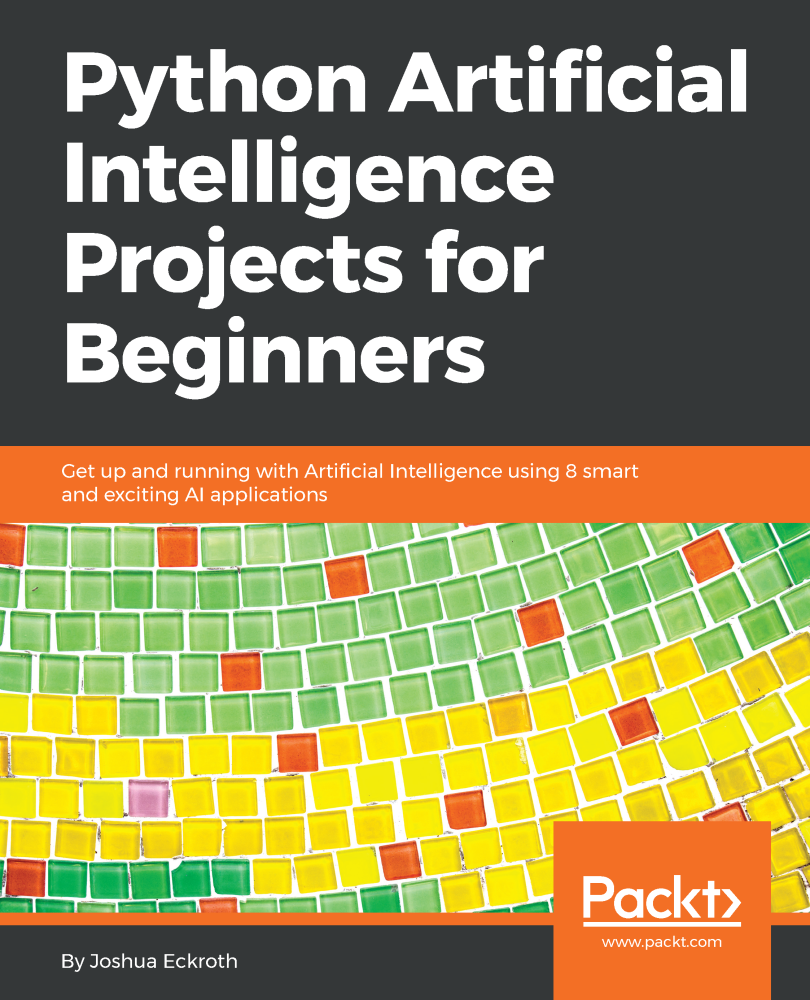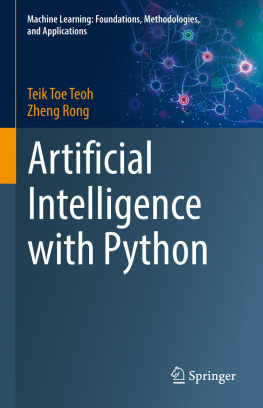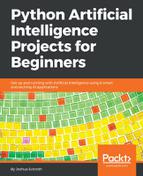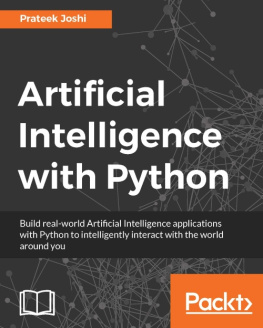
Python Artificial Intelligence Projects for Beginners
Get up and running with Artificial Intelligence using 8 smart and exciting AI applications
Joshua Eckroth

BIRMINGHAM - MUMBAI
Python Artificial Intelligence Projects for Beginners
Copyright 2018 Packt Publishing
All rights reserved. No part of this book may be reproduced, stored in a retrieval system, or transmitted in any form or by any means, without the prior written permission of the publisher, except in the case of brief quotations embedded in critical articles or reviews.
Every effort has been made in the preparation of this book to ensure the accuracy of the information presented. However, the information contained in this book is sold without warranty, either express or implied. Neither the author(s), nor Packt Publishing or its dealers and distributors, will be held liable for any damages caused or alleged to have been caused directly or indirectly by this book.
Packt Publishing has endeavored to provide trademark information about all of the companies and products mentioned in this book by the appropriate use of capitals. However, Packt Publishing cannot guarantee the accuracy of this information.
Commissioning Editor: Pravin Dhandre
Acquisition Editor: Joshua Nadar
Content Development Editors: Prasad Ramesh, Karan Thakkar
Technical Editor: Sagar Sawant
Copy Editor: Safis Editing
Project Coordinator: Nidhi Joshi
Proofreader: Safis Editing
Indexer: Pratik Shirodkar
Graphics: Jisha Chirayil
Production Coordinator: Arvindkumar Gupta
First published: July 2018
Production reference: 1300718
Published by Packt Publishing Ltd.
Livery Place
35 Livery Street
Birmingham
B3 2PB, UK.
ISBN 978-1-78953-946-2
www.packtpub.com
mapt.io
Mapt is an online digital library that gives you full access to over 5,000 books and videos, as well as industry leading tools to help you plan your personal development and advance your career. For more information, please visit our website.
Why subscribe?
Spend less time learning and more time coding with practical eBooks and Videos from over 4,000 industry professionals
Improve your learning with Skill Plans built especially for you
Get a free eBook or video every month
Mapt is fully searchable
Copy and paste, print, and bookmark content
PacktPub.com
Did you know that Packt offers eBook versions of every book published, with PDF and ePub files available? You can upgrade to the eBook version at www.PacktPub.com and as a print book customer, you are entitled to a discount on the eBook copy. Get in touch with us at service@packtpub.com for more details.
At www.PacktPub.com , you can also read a collection of free technical articles, sign up for a range of free newsletters, and receive exclusive discounts and offers on Packt books and eBooks.
Contributors
About the author
Joshua Eckroth is assistant professor of computer science at Stetson University, where he teaches big data mining and analytics, artificial intelligence (AI), and software engineering. Dr. Eckroth joined the math and computer science department at Stetson University in fall 2014. He earned his PhD from Ohio State University in AI and cognitive science, focusing on abductive reasoning and meta-reasoning.
Packt is searching for authors like you
If you're interested in becoming an author for Packt, please visit authors.packtpub.com and apply today. We have worked with thousands of developers and tech professionals, just like you, to help them share their insight with the global tech community. You can make a general application, apply for a specific hot topic that we are recruiting an author for, or submit your own idea.
Preface
Artificial Intelligence (AI) is the newest emerging and disruptive technology among varied businesses, industries, and sectors. This book demonstrates AI projects in Python, covering modern techniques that make up the world of AI.
This book begins with building your first prediction model using the popular Python library, scikit-learn. You will understand how to build a classifier using effective machine learning techniques: random forest and decision trees. With exciting projects on predicting bird species, analyzing student performance data, song genre identification, and spam detection, you will learn the fundamentals and various algorithms and techniques that foster the development of such smart applications. You will also understand deep learning and the neural network mechanism through these projects with the use of the Keras library.
By the end of this book, you will be confident to build your own AI projects with Python and be ready to take on more advanced content as you go ahead.
Who this book is for
This book is for Python developers who want to take their first step in the world of artificial intelligence using easy-to-follow projects. Basic working knowledge of Python programming is expected so that you can play around with the code.
What this book covers
, Building Your Own Prediction Models , introduces classification and techniques for evaluation, and then explains decision trees, followed by a coding project in which a predictor for student performance is built.
, Prediction with Random Forests , looks at random forests and uses them in a coding project for classifying bird species.
, Applications for Comment Classification , introduces text processing and the bag-of-words technique. Then shows how this technique can be used to build a spam detector for YouTube comments. Next, you will learn about the sophisticated Word2Vec model and practice it with a coding project that detects positive and negative product, restaurant, and movie reviews.
, Neural Networks , covers a brief introduction to neural networks, proceeds with feedforward neural networks, and looks at a program to identify the genre of a song with neural networks. Finally, you will revise the spam detector from earlier to make it work with neural networks.
, Deep Learning , discusses deep learning and CNNs. You will practice convolutional neural networks and deep learning with two projects. First, you will build a system that can read handwritten mathematical symbols and then revisit the bird species identifier and change the implementation to use a deep convolutional neural network that is significantly more accurate.
To get the most out of this book
- You need to have a basic understanding of Python and its scientific computing libraries
- Get Jupyter Notebook installed, preferably via Anaconda
Download the example code files
You can download the example code files for this book from your account at www.packtpub.com. If you purchased this book elsewhere, you can visit www.packtpub.com/support and register to have the files emailed directly to you.
Next page






